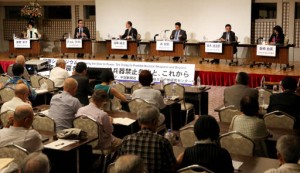International symposium in Hiroshima discusses challenges of nuclear weapons ban treaty and denuclearization of North Korea
Jul. 23, 2018
by Miho Kuwajima, Staff Writer
On July 22, an international symposium titled “Opening the Door to Peace: The Treaty to Prohibit Nuclear Weapons and Beyond” was held at the International Conference Center Hiroshima in Naka Ward. The symposium was co-sponsored by the Hiroshima Peace Institute at Hiroshima City University, the Chugoku Shimbun, and the Research Center for Nuclear Weapons Abolition (RECNA) at Nagasaki University, and attended by 260 people. The participants all listened closely to the discussions concerning the challenges involved in bringing the Treaty on the Prohibition of Nuclear Weapons into effect and the denuclearization of North Korea.
At the symposium, Tim Wright, 33, a member of the International Campaign to Abolish Nuclear Weapons (ICAN), the non-governmental organization (NGO) that was awarded last year’s Nobel Peace Prize, gave the keynote speech. Mr. Wright, who is engaged in the campaign to promote signatures for the treaty, made a strong call for the Japanese government to sign the agreement, saying, “I believe that most countries in the world will sign the treaty, and that the signatories will do their best to work toward eliminating the unparalleled threat posed by nuclear weapons.”
The panel discussion following the keynote speech centered on the denuclearization of the Korean Peninsula. Son Hyun Jin, an associate professor at the Hiroshima Peace Institute, gave a favorable evaluation of the June meeting between the U.S. and North Korean leaders, saying that the meeting is the first step toward establishing a new, more trusting relationship between these two nations. Seiji Endo, a professor in the Faculty of Law at Seikei University and an expert on international politics, said, “Nuclear deterrence will eventually lead to the proliferation of nuclear weapons. We should therefore work hard to prevent any war from occurring, rather than adopting a diplomatic policy which focuses only on applying pressure.”
Tatsujiro Suzuki, the director of RECNA, advocates the creation of a “Northeast Asia Nuclear-Weapon-Free Zone.” He said, “A nuclear-weapon-free zone can be realized in Northeast Asia. If the Japanese government joins the movement to support it, Japan will subsequently be able to withdraw from the nuclear umbrella.”
(Originally published on July 23, 2018)
On July 22, an international symposium titled “Opening the Door to Peace: The Treaty to Prohibit Nuclear Weapons and Beyond” was held at the International Conference Center Hiroshima in Naka Ward. The symposium was co-sponsored by the Hiroshima Peace Institute at Hiroshima City University, the Chugoku Shimbun, and the Research Center for Nuclear Weapons Abolition (RECNA) at Nagasaki University, and attended by 260 people. The participants all listened closely to the discussions concerning the challenges involved in bringing the Treaty on the Prohibition of Nuclear Weapons into effect and the denuclearization of North Korea.
At the symposium, Tim Wright, 33, a member of the International Campaign to Abolish Nuclear Weapons (ICAN), the non-governmental organization (NGO) that was awarded last year’s Nobel Peace Prize, gave the keynote speech. Mr. Wright, who is engaged in the campaign to promote signatures for the treaty, made a strong call for the Japanese government to sign the agreement, saying, “I believe that most countries in the world will sign the treaty, and that the signatories will do their best to work toward eliminating the unparalleled threat posed by nuclear weapons.”
The panel discussion following the keynote speech centered on the denuclearization of the Korean Peninsula. Son Hyun Jin, an associate professor at the Hiroshima Peace Institute, gave a favorable evaluation of the June meeting between the U.S. and North Korean leaders, saying that the meeting is the first step toward establishing a new, more trusting relationship between these two nations. Seiji Endo, a professor in the Faculty of Law at Seikei University and an expert on international politics, said, “Nuclear deterrence will eventually lead to the proliferation of nuclear weapons. We should therefore work hard to prevent any war from occurring, rather than adopting a diplomatic policy which focuses only on applying pressure.”
Tatsujiro Suzuki, the director of RECNA, advocates the creation of a “Northeast Asia Nuclear-Weapon-Free Zone.” He said, “A nuclear-weapon-free zone can be realized in Northeast Asia. If the Japanese government joins the movement to support it, Japan will subsequently be able to withdraw from the nuclear umbrella.”
(Originally published on July 23, 2018)








